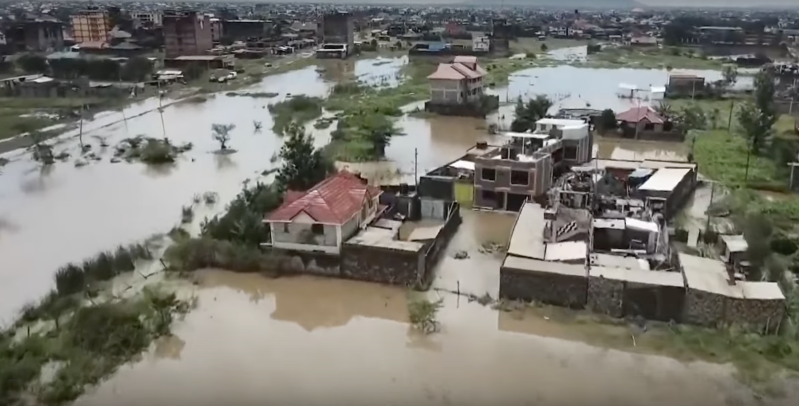
As Cyclone Hidaya looms over Eastern Africa, Kenya and Tanzania brace for yet another natural disaster. Still reeling from the aftermath of devastating floods that have claimed hundreds of lives and displaced thousands, torrential rains forecasted to hit the coastal city of Mombasa and the Eastern coast of Tanzania are causing major concerns.
Kenya’s President, William Ruto, said the government has adopted a “Whole of Government Approach” in response to the devastation that the rains and the countries’ “first ever “cyclone might cause.
Speaking during a National Address at State House Nairobi, the country’s president warned about the possible impact of the storm. “This cyclone, named Hidaya, could hit our shores any time now and is predicted to cause torrential rain, strong winds, and powerful and dangerous waves, which could potentially disrupt marine activities in the Indian Ocean and settlements along the Kenyan coast,” he said.
He announced that the Ministry of Education has been instructed to postpone school reopening until further notice. He also ordered mandatory evacuations for those located near dams and in flood-prone areas across the country due to recent heavy rainfalls.
“Security agencies are further directed to enlist the support of the National Youth Service and the national government administration officers to respond to this emergency, including ensuring timely, orderly and humane evacuation of all persons at risk,” he said.
Speaking to Christian Daily International, Martin Tlustos, Organizational & Technical Management lead at Care for Creation Tanzania shared his insights on a deeper narrative of how ecological stewardship intertwines with the gospel. He observes that as the impacts of climate change become ever more obvious all over Africa, and especially small scale farmers struggle with getting enough harvest, the issue of how to deal with this crisis is becoming a central issue across the region.
“The Anglican Church in Tanzania that we work with has adopted sustainable farming and Creation Care as one of its core initiatives. We have several projects within that Church and in other denominations that have asked us for guidance on how to start sustainable farming initiatives. Amongst those are Bible schools, secondary school projects, orphanages and other projects, both from Churches and from NGOs,” he said.
He noted that most pastors and churches struggle to engage their congregants on creation care and its link to the gospel which shifts the perspective of African Christians towards “survival”.
“One thing that I think is still lacking badly is good material about the theological connection between the Trinitarian God, Creation, Creation Care and the gospel. So many pastors aren't trained nor motivated enough to teach their people how to care for God's Creation by doing regenerative farming. At the moment I think the main focus for many African Christians (and others) is more on survival than caring for God's Creation, which is understandable given the dire situation many African farmers find themselves in,” he commented.
Care of creation Tanzania currently leads a project in Central Tanzania, with a 60 acre model farm and an attached training center where they hold four to six seminars per year, training people the basics of Farming God's Way, tree planting, Creation Care and selected permacultures techniques.
“I pray that our project together with others like the LEAD foundation, that focus on these problems – but also other organisations like Tear Fund and even Wycliffe, who have taken interest in these questions recently – will help the African Church become a transformative power in the agricultural development, while at the same time learn more about the power of the Gospel through regenerative farming and the theological foundations for it,” Tlustos said.





